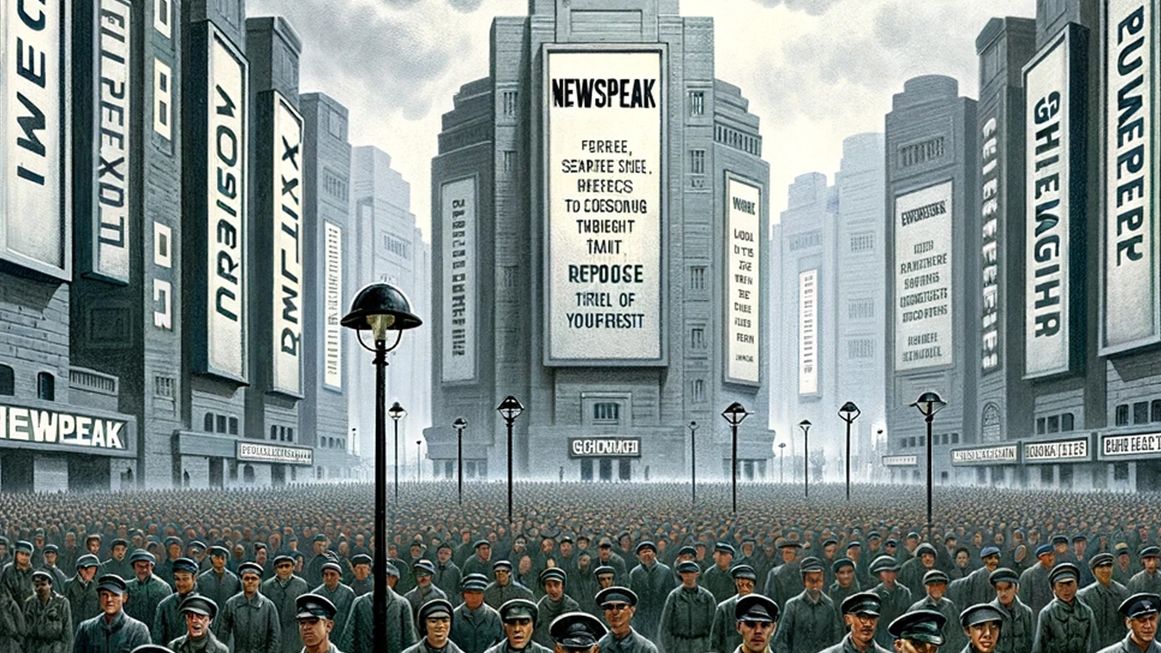Rethinking the 5-Paragraph Essay in the Age of AI
Artificial intelligence writes a pretty good analysis of George Orwell's 1984.


Will AI kill the five-paragraph essay? To find out, I asked my ninth grade English teacher.
The five-paragraph essay is a mainstay of high school writing instruction, designed to teach students how to compose a simple thesis and defend it in a methodical, easily graded package. It's literature analysis at its most basic, and most rigid, level.
A typical five-paragraph essay asks students to pick a simple thesis, usually from a list of prompts, and compose a short introductory paragraph, followed by three paragraphs each laying out a different piece of supporting evidence, followed by a final paragraph—usually beginning, "In conclusion…."
Critics argue this assignment kills student creativity and turns writing into an exercise in pure drudgery. I tend to agree, remembering my time spent composing five-paragraph essays as soul-rending—forcing me to focus on sticking to a formula and a restrictive prompt rather than actually analyzing the books I was reading.
But the sudden ubiquity of large language models such as ChatGPT threatens to upend this status quo.
"I am *shocked* by how good OpenAI's new chat" is, University of Toronto professor Kevin Bryan tweeted after the first release of ChatGPT. "You can no longer give take-home exams/homework."
To test this hypothesis, I sat down in front of ChatGPT and gave it a classic freshman-year English prompt: "Please write me an approximately 500-word, five-paragraph essay discussing the role of Newspeak in controlling the people of Oceania in George Orwell's novel, 1984. Please use MLA formatting and include 1–2 quotes per paragraph."
In response, it spit out an—ahem—six-paragraph, 588-word essay.
"In George Orwell's dystopian novel '1984,' the ruling Party of Oceania employs Newspeak as a potent tool for controlling the thoughts and behaviors of its citizens," the essay begins. "Newspeak, a language designed to limit freedom of expression and thought, serves as a mechanism for the Party to maintain its authoritarian rule and suppress dissent. Through the manipulation of language, the Party effectively restricts the ability of individuals to articulate dissenting ideas, ultimately consolidating its power over the population."
And then I sent it to my ninth grade English teacher.
Corey Craft taught English at the Alabama School of Fine Arts for nine years and now serves as an instructor in the school's creative writing department. A decade ago, I first read 1984 for his class.
"I'd give this essay a mid-level B—an 85," he told me. "Is the content OK? Sure. It's a little surface-level…but it gets the major points right."
Yet he also noted the essay's impressive vocabulary—phrases such as "linguistic manipulation" and "reshape historical narratives"—would sound some alarm bells. "There are words and concepts used in this paper that I would find suspicious coming from the average ninth grader," Craft added.
ChatGPT also made another glaring fumble—producing a six-paragraph essay, despite my multiple attempts to rephrase the prompt so it would stick to just five paragraphs.
While the typical ninth grade cheater might not be clever enough to fix these mistakes—Craft says he sometimes sees plagiarism where students have copy-pasted text without changing the font or text color—it's only a matter of time before tools such as ChatGPT work out these kinks.
Much to the chagrin of the five-paragraph essay's harshest critics, myself included, it doesn't look like ChatGPT will spell the end of the assignment. While five-paragraph essays are achingly dull, they do serve a simple purpose—they match the median student's ability level, even if it means leaving behind the significant minority of kids who can barely read by eighth grade and infuriating a small cohort of nerds who end up getting degrees in Renaissance literature.
There simply isn't an obvious alternative to the five-paragraph essay—and certainly not one that is somehow immune from inevitable AI mimicry. In a ChatGPT-saturated world, teachers will likely resort to giving students handwritten, in-class five-paragraph essays instead of ditching the assignment entirely—even if this is "more of a pain for the student to complete and more of a pain for the teacher to grade," Craft notes.
In short, rather than reshape writing instruction, educators will find new, less technology-dependent ways to keep doing the same thing.
"That may take trial and error," Craft says, "but that's part of the fun of the job."
This article originally appeared in print under the headline "Long Live the Five-Paragraph Essay?."
Editor's Note: As of February 29, 2024, commenting privileges on reason.com posts are limited to Reason Plus subscribers. Past commenters are grandfathered in for a temporary period. Subscribe here to preserve your ability to comment. Your Reason Plus subscription also gives you an ad-free version of reason.com, along with full access to the digital edition and archives of Reason magazine. We request that comments be civil and on-topic. We do not moderate or assume any responsibility for comments, which are owned by the readers who post them. Comments do not represent the views of reason.com or Reason Foundation. We reserve the right to delete any comment and ban commenters for any reason at any time. Comments may only be edited within 5 minutes of posting. Report abuses.
Please to post comments


After the Trump verdict, expect several Newspeak articles here to drop which really could have been AI-DNC scribed.
The AI writes better constructed arguments than Reason writers. It at least addresses information contrary to its constructed narrative. Reason writers leave glaring holes or fail to address conflicting information even when they present it
“Our articles have more holes than a sex workers union!” could be their motto?
https://www.pinterest.com/pin/246149935859907434/
And the Commie-Indoctrination debate today is -- How to keep those kids from cheating mobility lessons with drivers education! They must learn how to attach a horse to a wagon or they're just CHEATING!
I liked the five paragraph essay form. As someone with dylexia and other writing and reading problems in middle school, the concise format provided by the 5PE gave me a framework to form and condense my thoughts. I can see how a solid writer would feel constrained. Space constraints are clearly part of journalism as time constrained readers don't often want to read a long form essay when five paragraphs will do.
A lot of people complain about it, but I think it's a pretty good introduction and practice for academic and technical writing. The 5 paragraph form itself is pretty limiting and limited, but the basic principle is easily extended to longer form writing.
FWIW I had no idea such an absurd constraint existed. At my boarding school, typical for time and place, you wrote an essay, no word limit, no paragraph limit, it was just understood that it would be between 2 and 5 pages of lined A4. Girls typically wrote closer to 5 pages, I wrote typically closer to 2.
It’s worth nothing.
A4?
Tell us you didn't go to school in the US, without actually saying so.
US paper sizes
Indeed I did not go to school in the US. I am originally British and I went to an English boarding school.
Can we make kids any more stupid than they are now? Yes, says AI and it's Marxist, globalist cheerleaders.
its
My first 5 paragraph essay was about Johnny Bench, based on a book I was assigned about him. I’ll never forget that. I’d be willing to bet it’s still in a box in an attic somewhere.
ChatGPT overwrote the heck out of it. I’d never be able to pass that off as legit in grade school.
Isn't it likely that the teachers will be using AI to help grade essays? If so, why couldn't the types of essays that teachers allow be far broader than just five paragraph essays?
The 5PE is a pretty valid template for getting students to think critically about the order in which a reader will need information and to how much information. It doesn't have to be 5 paragraphs specifically, but intro, content, summary is a pretty useful setup. That's what this article does, after all.